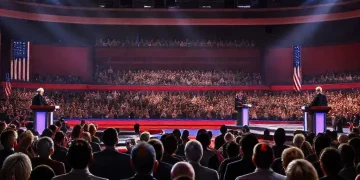Dinner gun control debate: what’s the real story?

The dinner gun control debate focuses on balancing individual rights with public safety, as recent legislation and cultural attitudes continue to shape how communities view firearm ownership and regulation.
Dinner gun control debate sparks conversations that many of us have at the dinner table. It’s not just about laws; it’s about personal stories and community safety. How do these discussions shape our views and world?
The historical context of gun control debates
The historical context of gun control debates provides necessary insight into how policies have evolved. Understanding this background can help us make sense of today’s discussions. For decades, gun control has been a contentious topic in the United States, deeply intertwined with issues of freedom, safety, and rights.
The Second Amendment
Central to this debate is the Second Amendment of the U.S. Constitution. This amendment grants citizens the right to keep and bear arms. Many Americans cherish this right, viewing it as essential to personal liberty.
Key Events in Gun Control History
Several significant events have shaped gun legislation throughout the years. Some pivotal moments include:
- The Gun Control Act of 1968, which introduced regulations for firearm sales.
- The Brady Handgun Violence Prevention Act of 1993, requiring background checks.
- The Federal Assault Weapons Ban of 1994, targeting specific firearms temporarily.
These events often reflect a reaction to violence and public safety concerns. However, they also provoke backlash from those who prioritize individual rights.
In considering the historical context, we find that gun control debates are not just modern. They reveal longstanding societal values about guns, culture, and regulation. The perspectives continue to evolve as new incidents arise, showcasing the ongoing struggle between safety and liberty.
While discussing gun control today, it’s important to remember the cultural attitudes that have surfaced over time. These beliefs influence how communities perceive gun ownership and regulation. As we delve deeper into the discussions surrounding gun control, historical context not only enriches our understanding but also informs future dialogues.
Key arguments for and against gun regulation
The key arguments for and against gun regulation are crucial to understanding the ongoing debate surrounding firearms in America. Each side presents compelling reasons that reflect values, safety, and rights.
Arguments in Favor of Gun Regulation
Proponents of gun regulation highlight several important points. They argue that stricter laws can lead to reduced violence and increase public safety. By implementing measures such as background checks and limits on certain firearms, communities may experience fewer incidents of gun-related crime.
- Reduction in accidental shootings, especially among children.
- Lower rates of gun violence in areas with strict regulations.
- Enhanced ability for law enforcement to track firearms.
These supporters often point to countries with stringent gun laws, showcasing a correlation between regulation and lower crime rates. They emphasize that public safety should come before individual rights when it involves potentially dangerous weapons.
Arguments Against Gun Regulation
On the opposite side, opponents argue that gun regulations infringes on personal freedoms. The Second Amendment is frequently cited as a fundamental right that must be preserved. Opponents believe that responsible gun ownership can lead to a safer society.
- Owning guns is a basic human right necessary for self-defense.
- Regulations may create barriers for law-abiding citizens while failing to deter criminals.
- Gun control can lead to a slippery slope of further restrictions on personal freedoms.
They assert that rather than restricting access, addressing issues like mental health and crime prevention is a more effective approach. The debate often becomes heated, as it encompasses deeply held beliefs about liberty and security.
As we examine both sides, it becomes clear that the gun regulation debate is more than just policy; it touches on deeply rooted values and concerns about safety, rights, and community well-being. Each argument brings perspective to the challenges facing lawmakers and the public alike, making it important to consider all viewpoints in this complex issue.
The impact of gun laws on community safety

The impact of gun laws on community safety is a pivotal topic in the ongoing discussion about firearms in America. Many believe that laws can significantly influence the levels of safety in neighborhoods.
How Gun Laws Affect Crime Rates
Research shows that areas with stricter gun laws often report lower crime rates. This connection suggests that effective gun regulations can deter criminal activity. For example, states with comprehensive background checks and restrictions on certain firearms tend to see decreases in gun violence.
- Fewer firearm-related homicides.
- Reduced incidents of mass shootings.
- Decrease in gun trafficking activities.
This evidence leads many advocates to argue that implementing stringent gun laws can create safer environments for all residents.
Community Perceptions of Safety
Community members often express mixed feelings about gun laws. Some feel safer knowing that there are regulations in place, while others worry that these laws impinge on their rights. These differing views shape the daily lives of citizens. When residents believe their safety is ensured through effective legislation, their overall quality of life tends to improve, fostering a sense of security.
On the other hand, when communities perceive gun laws as ineffective or overly restrictive, frustrations can lead to tension and social unrest. The debate over how best to balance safety and rights continues to be a challenge for lawmakers and citizens alike.
As we analyze the impact of gun laws on safety, it’s vital to consider both statistical data and personal experiences. Each community is unique, and understanding these differences can help tailor solutions that enhance safety while respecting individual rights and freedoms. This multifaceted approach is key to finding common ground in the complex discussions surrounding gun control.
Cultural attitudes towards guns in America
Cultural attitudes towards guns in America are deeply rooted in history and affect the way society views firearm ownership. These attitudes vary significantly across different regions and communities.
Historical Influences
From the founding of the United States, guns have played a crucial role in shaping the nation. The Second Amendment emphasizes the right to bear arms, reflecting the early American belief in personal freedom and self-defense. This historical context creates a foundation for the strong gun culture prevalent today.
- Rural areas often view guns as essential tools for hunting and protection.
- Urban environments may emphasize the risks associated with gun ownership, focusing on crime rates.
- Historical events, like the Wild West, contribute to the mythology surrounding guns and their role in American identity.
These factors combine to create a diverse range of beliefs about guns and their place in society.
Modern Perspectives
In contemporary America, perspectives about guns are often influenced by personal experiences and community values. For many, owning a firearm is associated with individual rights and responsibilities. Supporters of gun rights view firearms as a safeguard against tyranny and a means of self-protection.
However, there is a growing concern among some groups about the dangers associated with gun ownership. Events like mass shootings and increasing violence have led many to call for stricter regulations. These incidents often reinforce fears and lead to discussions about safety, responsibility, and community well-being.
As attitudes evolve, they impact legislation and community norms. Advocacy groups on both sides of the debate work tirelessly to influence public opinion and shape policies regarding firearms. Understanding these cultural attitudes is key to navigating the complex discussions about gun control and safety in America.
Recent developments in gun legislation
Recent developments in gun legislation showcase the evolving landscape of gun control in America. As issues of safety and rights continue to ignites debates, lawmakers are responding with new bills and regulations.
Significant Changes in Laws
In the past few years, several states have enacted major changes to their gun laws. These efforts aim to address concerns about gun violence and public safety. Some key developments include:
- Introducing universal background checks to prevent guns from falling into the wrong hands.
- Implementing red flag laws that allow law enforcement to temporarily remove firearms from individuals deemed a danger to themselves or others.
- Stricter regulations on assault weapons and high-capacity magazines.
These changes reflect growing public concern over incidents of gun violence, making it a hot topic among voters and advocacy groups.
Ongoing Discussions and Proposals
Discussions surrounding gun legislation are not limited to just one side of the debate. Advocacy groups for both gun rights and gun control are actively pushing for their agendas. As a result, there are numerous proposals currently circulating in legislative chambers across the country.
Supporters of gun rights argue for protecting individual freedoms while emphasizing responsible gun ownership. Conversely, proponents of gun control advocate for measures they see as necessary to reduce violence and enhance safety in communities. This clash of perspectives forms a critical part of the legislative conversation.
Additionally, recent events, such as mass shootings, often lead to renewed calls for action. These tragic occurrences frequently shift public opinion and can accelerate the legislative process.
As states continue to navigate these important issues, the push and pull between differing beliefs fosters a complex landscape. Understanding these recent developments in gun legislation is essential for grasping the current state of the gun control debate in America.
FAQ – Frequently Asked Questions about Gun Control and Legislation
What are the main arguments for stricter gun control laws?
Advocates for stricter gun control laws argue that such measures can reduce gun violence, promote public safety, and prevent firearms from falling into the hands of dangerous individuals.
How have recent events impacted gun legislation?
Recent mass shootings and violent incidents have prompted lawmakers and the public to reassess existing gun laws, leading to calls for new regulations and reforms to enhance community safety.
What role do advocacy groups play in the gun regulation debate?
Advocacy groups on both sides actively participate in the gun regulation debate by influencing public opinion, lobbying lawmakers, and raising awareness about their respective positions.
How does cultural attitude toward guns affect legislation?
Cultural attitudes toward guns vary significantly across the U.S. and can shape public opinion, thereby influencing lawmakers’ decisions about gun policies and regulations in different communities.





